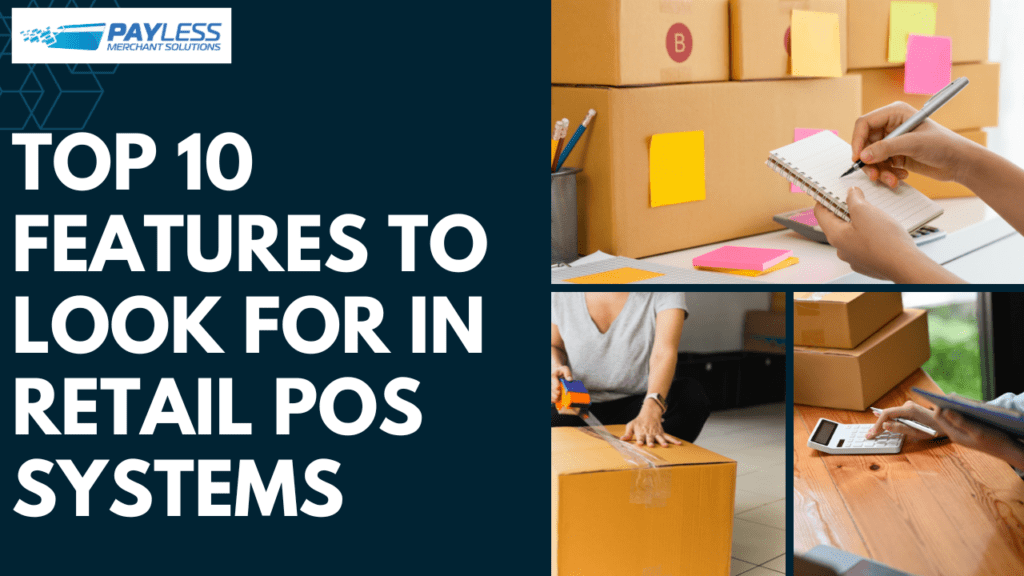Top 10 Features to Look for in Retail POS Systems

Running a retail business depends on keeping track of inventory, sales, and customers efficiently. With the increasing demand for mobile payment solutions, businesses seek innovative ways to streamline operations and improve customer experiences. Choosing the right and effective Point of Sale (POS) system makes managing all these essential tasks much easier. As technology advances, so do POS systems, with new features that enable you to manage transactions, inventory, and customer interactions efficiently. The best retail POS system should have these top 10 features
1. User-Friendly Interface
A user-friendly interface of a POS system ensures smooth operations. Your employees’ ability to quickly navigate the system, reduce training time, and minimize errors can be strengthened with a Clean design of the POS system. Staff will be more productive and error-free transactions, contributing to a positive customer experience.
2. Inventory Management Capabilities
When businesses upscale, monitoring inventory levels in real-time for retail outlets becomes critical to avoid stockouts and dead stead. To keep optimal levels in inventory, you need an advanced POS system. An advanced POS system efficiently handles inventory across multiple locations, tracks stock counts, and automatically generates restock orders, ensuring you never run out of popular products.
3. Integrated Payment Processing
Customers expect and value swift and secure payment processing. Best retail POS systems can process all kinds of payments like cash, credit cards, or mobile wallets. The system should seamlessly integrate with payment processors to authorize credit/debit transactions. Select a POS system that has zero fee merchant processing options and provides mobile payment solutions. Reliable and secure merchant services benefit the reputation of your business and contribute to customer satisfaction.
4. Cloud-Based Accessibility
Cloud-based POS systems offer the flexibility of accessing data from anywhere at any time. They allow you to manage your business from anywhere, providing real-time data and updates. This feature is invaluable for retailers seeking innovative and secure merchant services. However, along with other benefits, businesses must consider factors like data security and internet dependency. Choosing a web-based system that allows you to manage your business remotely and provides regular automated backups lets you focus on areas needing in-person attention.
5. Customizable Reporting Features
A POS system that can generate easy-to-understand sales reports, revenues, taxes, returns, and transaction history could be a valuable addition to the business plan. Look for a POS system to customize reports by date, store, or product. Such statements can help you identify trends and gaps leading to opportunities for growth.
6. Customer Relationship Management (CRM) Integration
Building and maintaining strong customer relationships is a priority for retail businesses. CRM integration in POS systems facilitates personalized interactions and enhances customer loyalty. It manages a database of your customer purchase history, tracks their preferences, and helps develop a targeted marketing strategy. This customer profile building helps enhance the shopping experience and improve customer service.
7. Security Measures
Protecting customer payment data is critical for every retailer. When deciding on POS systems, ensure they offer top-notch security like end-to-end encryption, tokenization, multi-factor authentication, and compliance with industry standards. By protecting both transactions and customer information, you can instill trust in your clientele.
8. Scalability for Business Growth
A scalable POS system seamlessly adapts to your business growth, handling more transactions, diverse product lines, increased inventory, and the addition of new locations and users. With a web-based solution, you can easily connect new stores to the existing system. Ensure your POS system can expand effortlessly through modular features or simple integration.
9. Customer Support and Training
Look for POS providers that offer comprehensive training programs. Well-trained staff can maximize the potential of your POS system, improving efficiency and customer service. Even the most advanced POS systems can sometimes face issues. Prompt and responsive technical support is crucial to minimize downtime and ensure operations run smoothly.
10. Mobile Compatibility
In today’s fast-paced retail environment, mobile compatibility is a must. A POS system with mobile payment solutions allows you to process transactions on the go, enhancing customer convenience and boosting sales. With mobile POS capabilities, retailers can check out shoppers from anywhere in the store using a tablet or smartphone paired with the POS software. This innovative mobile technology enables staff to meet customers anywhere in the store and capture more sales opportunities. Mobile compatibility facilitates payment processing and inventory management from any location.
Conclusion:
Choosing the right POS system is a significant decision with a direct impact on your ability to effectively manage crucial retail operations. Take into account your business’s specific needs and thoroughly assess the capabilities of both hardware and software. The ideal retail POS system should effortlessly handle sales processing, inventory management, reporting, staff management, customer relationships, and more.
Focus on selecting software that is mobile, secure, and scalable. Look for a system with a user-friendly interface, providing you with the tools to elevate your retail business to new heights. An advanced POS system, incorporating features like mobile payment solutions and zero-fee merchant processing, allows you to streamline processes, gain valuable insights into your business, and enhance overall customer satisfaction.
Recent Posts
- Securing Your Small Business: Best Practices in Payment Security
- How Small Business Merchant Services Can Boost Your Bottom Line?
- The Impact of E-commerce on Small Business Merchant Services
- How Merchant Services Can Support Growth for Small Businesses
- Unlocking the Potential: The Pros and Cons of Open Source Retail POS Systems
Recent Comments